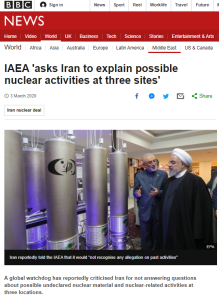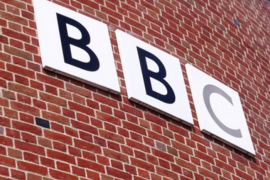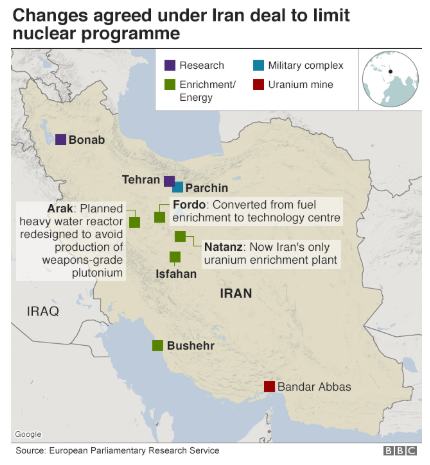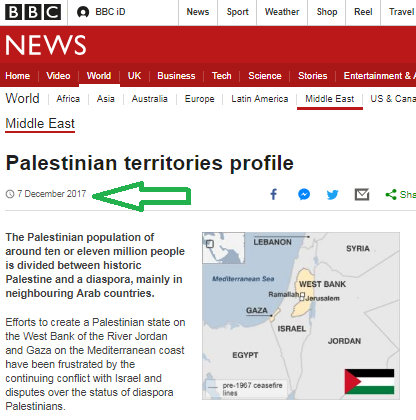On March 3rd a report appeared on the BBC News website’s ‘Middle East’ page under the headline “IAEA ‘asks Iran to explain possible nuclear activities at three sites’”. The article opens:
“A global watchdog has reportedly criticised Iran for not answering questions about possible undeclared nuclear material and nuclear-related activities at three locations.
A leaked International Atomic Energy Agency document sent to member states said requests for access to two of the unidentified sites had been denied.”
The IAEA is of course not merely “a global watchdog”: it is autonomous organisation within the United Nations system and it is charged with verifying Iran’s compliance with the JCPOA.
The report goes on:
“It is not clear what IAEA inspectors suspect might have happened at them.
But it is thought the activities took place in the early 2000s.
That is long before Iran struck a landmark deal with world powers that placed limits on its nuclear programme in return for the lifting of sanctions.”
That framing whitewashes the fact that Iran ratified the nuclear Non-proliferation Treaty (NPT) in 1970, that the IAEA found Iran to be non-compliant in 2005, that the UN Security Council imposed sanctions on Iran in 2006, passed a related resolution in 2007, another in 2008 and another in 2010. In other words, the BBC’s suggestion that “limits” on the Iranian nuclear programme only came into effect after the JCPOA was agreed is inaccurate and misleading.
Later in the report readers find the inevitable BBC amplification of the claim that “Iran insists its nuclear programme is exclusively for peaceful purposes” and a misleading map which has appeared in previous BBC reports. Only in the article’s final sentences are they told that:
“Despite Iran’s denials, evidence collected by the IAEA suggests that until 2003 the country conducted “a range of activities relevant to the development of a nuclear explosive device”. Some of those activities allegedly continued until 2009.”
Readers are told that:
“The confidential IAEA report seen by journalists in Vienna on Tuesday said Iran had failed to co-operate with investigations into three sites of interest.
“Iran has not provided access to the agency to two locations… and not engaged in substantive discussions to clarify agency questions related to possible undeclared nuclear material and nuclear-related activities,” Reuters news agency quoted it as saying.”
And:
“Diplomats said the three sites did not include one where the IAEA said last year that inspectors had detected uranium particles of man-made origin.
The inspectors are believed [sic] to have taken samples from a location in Tehran’s Turquzabad district – the area where Israeli Prime Minister Benjamin Netanyahu has alleged Iran had a “secret atomic warehouse”. Iranian officials have insisted the site was merely a carpet-cleaning factory.”
However the BBC did not inform readers that Reuters also reported that:
“…the IAEA at first resisted public pressure from Israeli Prime Minister Benjamin Netanyahu to visit a site he cited in a speech to the United Nations General Assembly in 2018, calling it a “secret atomic warehouse” mentioned in a trove of data seized by Israeli intelligence agents. Tehran has said the site is a carpet-cleaning facility.
But the IAEA inspected the site in February of last year, diplomats say, and gathered environmental samples that showed traces of uranium that Iran has yet to fully explain.
Now the agency is seeking access to one or more sites mentioned in that trove, which Israel refers to as the “atomic archive” of information on Iran’s former nuclear weapons program.”
Towards the end of the BBC’s report readers are informed that:
“The leaked IAEA report said Iran had responded to the questions about the three sites by saying it would “not recognise any allegation on past activities”.”
The report did not clarify that, contrary to Iranian claims, the IAEA has the authority to carry out inspections it deems necessary.
When, in 2018, Israel made public the data obtained concerning Iran’s nuclear programme, the BBC reported that information as being “nothing new”. Apparently the IAEA now believes that it is necessary to investigate sites named in that data but the BBC has not clarified that point to its audiences.
Related Articles:





